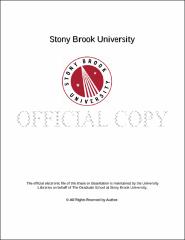| dc.identifier.uri | http://hdl.handle.net/11401/77556 | |
| dc.description.sponsorship | This work is sponsored by the Stony Brook University Graduate School in compliance with the requirements for completion of degree. | en_US |
| dc.format | Monograph | |
| dc.format.medium | Electronic Resource | en_US |
| dc.language.iso | en_US | |
| dc.publisher | The Graduate School, Stony Brook University: Stony Brook, NY. | |
| dc.type | Dissertation | |
| dcterms.abstract | This dissertation examines the relationship between literary modernism's mixed-genre forms and its representations of marginalized characters through a study of works by Djuna Barnes, Virginia Woolf, Gertrude Stein, and H.D. I argue that these authors borrow from various established genres to create new hybrid forms capable of granting fuller expression to the female and queer subjects of the early twentieth century. Though scholars took up hybridity as a way to theorize postcolonial identities and forms of resistance in the 1990s, this project reveals that the aforementioned modernist authors began to strategically deploy forms of hybrid subjectivity decades earlier. Marked by radical social change engendered by the suffrage movement, the Harlem Renaissance, and the consolidation of identity categories based on sexual acts, the turn of the twentieth century ushered in a range of new, emergent subjectivities. The works discussed herein reflect social and cultural understandings of these new subjects as fundamentally hybrid, as embodying a form of personhood that is intrinsically other. Expressions of hybrid subjectivity in the literature of this period take the form of hyphenated identities, such as African-American; denigrating homophobic epithets, such as " half-man" ; or dehumanizing metaphors, such as monstrous feminine. Yet, the works of Barnes, Woolf, Stein, and H.D., I argue, do more than mirror sociocultural assessments of hybrid subjects; they challenge these troubling representations and deploy new counterhegemonic conceptions of hybrid subjectivity. Through an analysis of works by these queer modernist authors, this project demonstrates how representations of hybrid forms and subjectivities can be used to enact a critique of oppressive social and literary constructs. I conclude with a brief study of Alison Bechdel's graphic memoir <italic>Fun Home</italic> as an example of a hybrid " metamodernist" text that extends and reanimates the aesthetic and sociopolitical imperatives found in the works of Barnes, Woolf, Stein, and H.D. My scholarship adds to feminist and queer studies of modernist literature by revealing both the prevalence and the potential utility of hybridity as an expression of modern marginalized subjectivities. Furthermore, this dissertation offers a thorough study of the under-theorized generic particularities of hybrid texts that strive toward these ends. | |
| dcterms.available | 2017-09-20T16:52:54Z | |
| dcterms.contributor | Marshik, Celia | en_US |
| dcterms.contributor | Haralson, Eric | en_US |
| dcterms.contributor | Diedrich, Lisa | en_US |
| dcterms.contributor | Detloff, Madelyn. | en_US |
| dcterms.creator | Fox, Meghan C. | |
| dcterms.dateAccepted | 2017-09-20T16:52:54Z | |
| dcterms.dateSubmitted | 2017-09-20T16:52:54Z | |
| dcterms.description | Department of English. | en_US |
| dcterms.extent | 270 pg. | en_US |
| dcterms.format | Monograph | |
| dcterms.format | Application/PDF | en_US |
| dcterms.identifier | http://hdl.handle.net/11401/77556 | |
| dcterms.issued | 2015-08-01 | |
| dcterms.language | en_US | |
| dcterms.provenance | Made available in DSpace on 2017-09-20T16:52:54Z (GMT). No. of bitstreams: 1
Fox_grad.sunysb_0771E_12055.pdf: 4028579 bytes, checksum: c21d5c4859f37ede4d9aa7b534d1089d (MD5)
Previous issue date: 2014 | en |
| dcterms.publisher | The Graduate School, Stony Brook University: Stony Brook, NY. | |
| dcterms.subject | Modern literature | |
| dcterms.subject | feminism, hybridity, minor literature, modernism, queer theory | |
| dcterms.title | Marginal Forms and Marginalized Subjectivities: The Hybrid Modernisms of Barnes, Woolf, Stein, and H.D. | |
| dcterms.type | Dissertation | |

